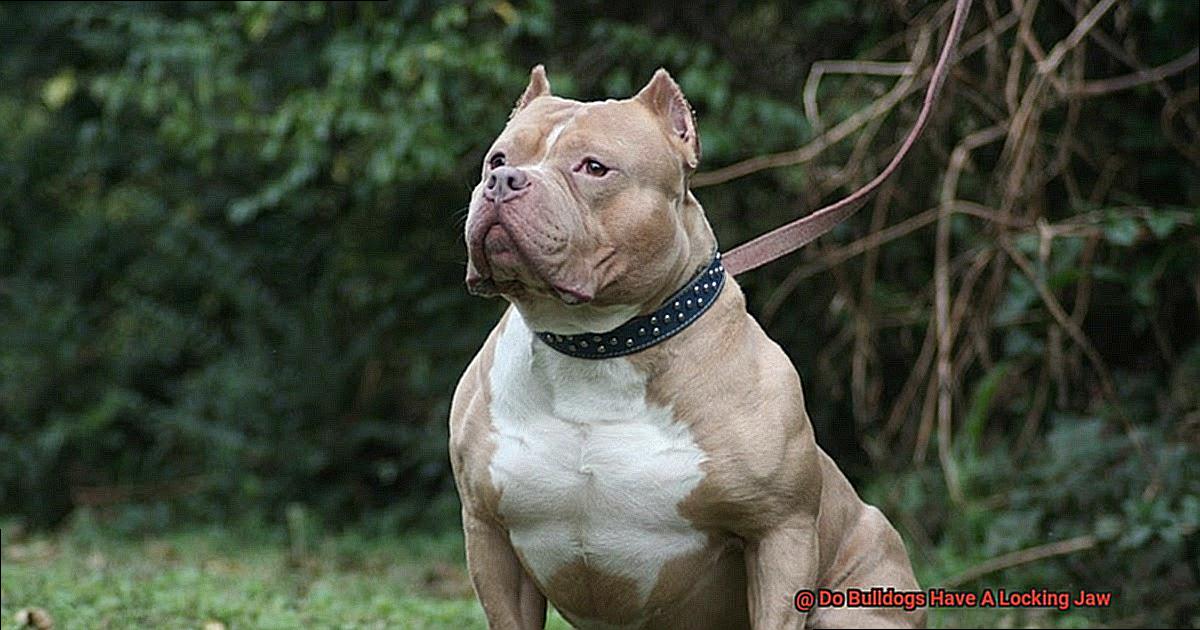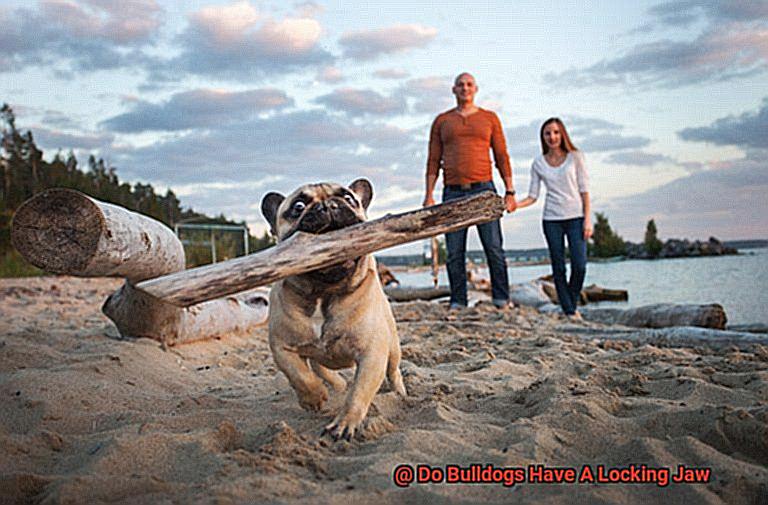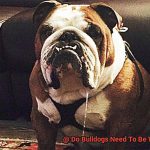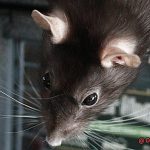Do Bulldogs Have A Locking Jaw?
Today, we’re diving headfirst into the captivating world of Bulldogs to debunk a long-standing myth – their so-called “locking jaws.” As an expert in all things canine, I’m here to separate fact from fiction and shed light on the truth behind this enigmatic claim. So, buckle up and get ready to uncover the real story behind Bulldogs and their jaws.
The idea that Bulldogs have a locking jaw has been swirling around for ages, captivating dog lovers and professionals alike. But let me tell you straight up – it’s nothing more than an urban legend. Bulldogs, just like any other breed out there, do not possess some magical mechanism that allows their jaws to lock into place.
Now, I get where this myth comes from. Bulldogs have a tenacious spirit and were originally bred for bull-baiting. Their strong grip might have been misinterpreted as having a locked jaw. Sure, their muscular jaws are mighty powerful and can hold on tight to objects, but that doesn’t mean they’re stuck in place or impossible to open.
And here’s another thing – all dogs share the same basic jaw structure. There are no special features exclusive to Bulldogs that enable some mythical locking mechanism. Sure, they’ve got those adorable stocky bodies, wide heads, and strong jaws – but their jaw mechanics are no different from any other four-legged friend.
So there you have it – the mystery of Bulldogs and their supposed locking jaws is officially debunked. These wrinkled wonders don’t possess any extraordinary anatomical tricks when it comes to their mouths. Instead, it’s their inherent determination, muscular build, and unwavering spirit that give them a reputation for having a powerful grip.
Knowing the truth behind popular misconceptions is crucial for responsible pet ownership and ensuring our furry friends’ well-being. Bulldogs are lovable companions known for their affectionate nature and unique appearance, but let’s leave the myths behind when it comes to their jaw mechanics.
Stay tuned, my friends, because we’re just scratching the surface of fascinating pet myths that need unraveling. Together, we’ll keep spreading accurate information and celebrating our beloved pets without the weight of falsehoods.
The Misconception of Bulldogs Having a Locking Jaw
Contents
- 1 The Misconception of Bulldogs Having a Locking Jaw
- 2 Physical Characteristics That Contribute to a Bulldog’s Bite Strength
- 3 Bulldogs Are Not Aggressive Dogs
- 4 The Tenacity of Bulldogs and Their Stubbornness
- 5 Anatomy of the Bulldog’s Jaw: No Locking Mechanism
- 6 Responsible Ownership for French Bulldogs
- 7 Training and Socialization for French Bulldogs
- 8 Debunking Myths About French Bulldogs and the Locking Jaw
- 9 Conclusion
This misconception has been perpetuated for years, causing unnecessary fear and misunderstanding about our beloved furry friends. In this article, we will dive deep into this topic and debunk the myth once and for all, providing you with accurate information and a better understanding of your French Bulldog’s jaw strength.
The Truth Behind the Myth:
Contrary to popular belief, Bulldogs, including French Bulldogs, do not possess a locking jaw. This myth likely stems from their strong and determined nature, as well as their powerful bite. Bulldogs were originally bred for bull-baiting, where their strong jaws were necessary to hold onto the bull during fights. However, this does not mean that they have a physiological mechanism that locks their jaws in place.
Understanding Bulldog Anatomy:
To comprehend why Bulldogs have a strong bite, it’s essential to consider their anatomy. Bulldogs have a wide, square-shaped head with prominent jaws and robust muscles around their mouth. These physical features allow them to exert more force when biting compared to other dog breeds. However, this does not involve any locking mechanism in their jaws.
Jaw Mobility and Brachycephalic Anatomy:
Another factor that may contribute to the misconception is the occasional difficulty some Bulldogs have in opening their mouths wide. Due to their brachycephalic (short-nosed) anatomy, Bulldogs may experience limited jaw mobility. This can result in difficulties when eating certain types of food or objects. However, it is crucial to note that this is not the same as having a locking jaw.
Promoting Responsible Ownership:
Dispelling the myth of the bulldog locking jaw is essential for promoting responsible ownership and understanding our pets better. French Bulldogs are known for their friendly and gentle nature, making them wonderful companions. It’s crucial to focus on proper training, socialization, and responsible ownership rather than perpetuating misconceptions about their physical attributes.
Physical Characteristics That Contribute to a Bulldog’s Bite Strength
French Bulldogs boast well-developed jaw muscles called masseters. These powerful muscles are larger and stronger compared to other breeds, allowing them to exert tremendous force when biting down. So, when your Frenchie sinks their teeth into their favorite chew toy or treats, you’ll witness their jaw muscles in action.
Head Shape: Building a Solid Foundation
The broad and square-shaped head of a French Bulldog provides a strong foundation for their bite. This unique head structure allows for a greater surface area for the attachment of jaw muscles, maximizing their biting power.
Jaw Structure: Sturdy and Reliable
French Bulldogs possess a robust and sturdy jaw structure. Their jaws are not only wide but also have a wide gape, enabling them to open their mouths wider and generate more force when biting down. This feature comes in handy when they need to clamp onto something or hold onto prey during playtime.
Teeth: Sharp Fangs and Crushing Molars
A French Bulldog’s teeth also contribute to their bite strength. They have sharp canines designed for puncturing and gripping, allowing them to latch onto toys with ease. Additionally, their strong molars provide crushing pressure when needed, making them formidable chewers.
Overall Build: Muscular Powerhouses
Don’t let their small size fool you. French Bulldogs have a muscular and compact body that enhances their bite strength. This physical build provides stability and strength crucial for delivering powerful bites. Their low center of gravity further adds balance and leverage to their biting capabilities.
Conclusion:
With their well-developed jaw muscles, broad head shape, sturdy jaw structure, sharp teeth, and overall muscular build, French Bulldogs possess an impressive bite strength that sets them apart. Remember, their biting power comes from their physical attributes rather than any locking mechanism in their jaws.
So next time you witness the strength behind your French Bulldog’s bite, you can appreciate the incredible combination of physical characteristics that make them such formidable chewers. Happy chewing to all our fellow Frenchie enthusiasts out there.
Bulldogs Are Not Aggressive Dogs

French Bulldogs are often unfairly labeled as aggressive dogs due to their muscular appearance and historical connection to bull-baiting. However, it is essential to understand that bulldogs are not naturally aggressive animals. In fact, they possess a gentle and affectionate temperament, making them ideal family pets. In this blog post, we will explore the reasons why bulldogs are not aggressive dogs and debunk the misconceptions surrounding their temperament.
The History of Bulldogs:
Bulldogs were originally bred for bull-baiting, a brutal sport that required dogs to display tenacity and bravery. However, it is crucial to note that this aggression was specifically directed towards bulls, not humans. Over time, breeders focused on developing a more gentle and docile temperament, resulting in the friendly bulldogs we know today.
Gentle and Affectionate Nature:
Bulldogs are known for their patience and tolerance, especially with children. Their protective nature towards kids has earned them the nickname “nanny dogs.” These dogs bond deeply with their families and enjoy spending quality time with their human companions.
Sociable Demeanor:
Contrary to popular belief, bulldogs are friendly and sociable animals. They generally get along well with other animals and strangers when properly socialized from an early age. With proper training and exposure, bulldogs can thrive in various social settings.
Individual Variations:
Just like any other dog breed, individual bulldogs may exhibit variations in temperament. Factors such as genetics, socialization, and upbringing can influence a dog’s behavior. Responsible ownership, including providing proper training and care, plays a crucial role in shaping a bulldog’s personality.
The Tenacity of Bulldogs and Their Stubbornness
Bulldogs are known for their tenacity and stubbornness, which are traits that have been bred into them over the years. This tenacity can be seen in various aspects of their behavior, including their determination to hold onto objects or not let go of something once they have a firm grip on it.
One of the reasons Bulldogs are so tenacious is their strong bite force. Their jaws are powerful and designed for gripping and holding onto things. However, it is important to note that Bulldogs do not have a locking jaw, contrary to popular belief.
The idea of Bulldogs having a locking jaw may have stemmed from their strong jaw muscles and the way they hold onto objects. When Bulldogs bite down on something, their strong jaws exert pressure, making it difficult for them to release the grip voluntarily. This can give the impression of a locking mechanism, but it is simply due to their muscular strength.
Bulldogs’ tenacity and stubbornness can be both a positive and a challenging trait for owners. On one hand, it makes them determined and persistent, which can be beneficial in certain situations such as training or tasks that require focus and endurance. On the other hand, their stubbornness can make them resistant to commands or difficult to redirect when they become fixated on something.
Training Bulldogs requires patience, consistency, and positive reinforcement techniques. Their stubborn nature means that traditional training methods based on dominance or punishment may not be effective. Instead, trainers should focus on building a strong bond with their Bulldog, understanding their motivations, and using reward-based methods to encourage desired behaviors.
It is important for Bulldog owners to establish themselves as the leader and set clear boundaries and rules from an early age. Consistency and positive reinforcement are key in shaping their behavior and encouraging obedience. Engaging in regular mental stimulation activities and providing structured routines can also help channel their tenacity in a productive way.
Despite their stubbornness, Bulldogs are generally good-natured and loyal companions. Their tenacity and determination can be endearing qualities, and with proper training and socialization, they can become well-behaved and obedient pets.
Anatomy of the Bulldog’s Jaw: No Locking Mechanism
Well, in this blog post, we’re going to delve into the anatomy of the bulldog’s jaw and debunk the myth of the “locking jaw.” So sit back, relax, and let’s get to know your pup’s jaw structure a little better.
The Bulldog’s Unique Jaw Structure:
- Bulldogs have a short and wide jaw, which gives them their adorable underbite.
- Their lower jaw slightly protrudes beyond the upper jaw, providing better grip and stability when biting down on objects.
No Locking Mechanism:
- Unlike certain breeds like terriers or mastiffs, bulldogs do not have a locking mechanism in their jaw.
- Once a bulldog’s jaw is closed, it does not stay locked in place.
- Bulldogs rely on their strong muscles and wide jaw to hold onto objects securely.
Powerful Muscles and Bite Strength:
- Bulldogs have muscular jaws that allow them to exert significant force when biting down.
- This results in their reputation for having a strong bite strength.
- However, their jaw does not lock into place – it’s all about muscle power.
Determination and Grip Strength:
- Bulldogs are known for their determination and tenacity when it comes to gripping onto objects.
- This can give the impression that their jaw is locked, but it’s really just their strong grip strength at play.
Caring for Your Bulldog’s Jaw:
- Provide appropriate chew toys and treats that are safe for their unique jaw structure.
- Regularly monitor their dental health as bulldogs are prone to dental issues due to their jaw shape.
Responsible Ownership for French Bulldogs
In this comprehensive guide, we will explore the key aspects of responsible ownership for French Bulldogs. Let’s dive in.
Diet:
French Bulldogs are prone to obesity, so a balanced and nutritious diet is crucial. Consult with your veterinarian to determine the appropriate type and amount of food for your Frenchie. Remember, portion control is essential.
Exercise:
While French Bulldogs may not be the most athletic breed, they still need daily exercise to maintain a healthy weight and prevent boredom. Short walks, playtime, and mental stimulation activities are all great options.
Grooming:
Frenchies have a short coat that requires regular brushing to remove loose hairs and keep their skin healthy. Don’t forget to clean their facial wrinkles and ears regularly to prevent infections.
Training and Socialization:
Consistent positive reinforcement training is key to ensuring good behavior in French Bulldogs. Socialize them with other dogs and people from a young age to prevent behavioral issues later on.
Health Care:
French Bulldogs are prone to certain health problems, so regular veterinary check-ups, vaccinations, and preventive measures are necessary. Pay attention to their breathing, allergies, and joint issues.
Safe Environment:
Create a safe and comfortable space for your Frenchie by removing hazards such as toxic plants and small objects that could be swallowed. Provide a cozy bed, toys, and a designated relaxing area.
Training and Socialization for French Bulldogs
French Bulldogs are beloved for their adorable appearance and affectionate nature. However, like any other dog breed, they require proper training and socialization to thrive in a domestic setting. In this blog post, we will explore the importance of training and socialization for French Bulldogs and provide practical tips to help you raise a well-behaved and socially adaptable companion.
Training Techniques for French Bulldogs:
- Positive Reinforcement: French Bulldogs respond best to positive reinforcement training methods. This involves rewarding desired behaviors with treats, praise, or playtime. Avoid using punishment or physical force, as it can lead to fear and aggression.
- Basic Obedience Training: Teach your Frenchie commands like sit, stay, come, and leave it from an early age. Start with short training sessions and gradually increase the duration as their attention span improves.
- Fun and Engaging Sessions: French Bulldogs have a stubborn streak, so make training sessions enjoyable by incorporating interactive toys or play into the exercises. Consistency is key, so schedule regular training sessions to reinforce their learning.
Socialization for French Bulldogs:
- Early Socialization: Introduce your Frenchie to various people, animals, and environments from a young age. This helps them develop confidence and prevents behavioral issues such as fear or aggression towards strangers or other dogs.
- Controlled Exposure: Gradually introduce your Frenchie to new experiences in a controlled manner. Take them on walks in different neighborhoods, invite friends over to meet them, or enroll them in puppy socialization classes.
- Leash Etiquette: Due to their brachycephalic structure, French Bulldogs may struggle with breathing while pulling on a leash. Use a harness instead of a collar to prevent pressure on their neck and windpipe. Start leash training early and reward calm walking behavior.
The Benefits of Training and Socialization:
- Well-Behaved Companions: Proper training ensures that your French Bulldog understands basic commands and behaves appropriately in various situations, making them a pleasure to have around.
- Adaptability: Socialization helps your Frenchie become comfortable in different environments, reducing anxiety and preventing behavioral issues when faced with new experiences.
- Enhanced Safety: Training your Frenchie to listen to commands like “come” or “leave it” can prevent accidents or dangerous situations, providing an extra layer of safety for both you and your pet.
Debunking Myths About French Bulldogs and the Locking Jaw
French Bulldogs are adorable, affectionate, and make wonderful companions. However, there are many myths and misconceptions surrounding this beloved breed. One of the most persistent myths is that French Bulldogs have a locking jaw. In this section, we will debunk this myth and provide you with the accurate information you need to understand the true nature of French Bulldogs.
The Truth about French Bulldogs’ Jaw Structure
Contrary to popular belief, French Bulldogs do not have a locking jaw. Their jaw structure is no different from any other dog breed. Bulldogs, including French Bulldogs, have a normal hinge joint that allows for opening and closing of the jaw. There is no mechanism in their jaws that locks them in place.
The Origin of the Locking Jaw Myth
The myth of the locking jaw likely stems from the historical purpose of Bulldogs. Bulldogs were originally bred for bull-baiting, a sport where they would latch onto a bull’s nose and not let go. This required a strong grip and bite force. However, it does not mean that their jaws have the ability to lock. The misconception may also be fueled by the determination and tenacity of Bulldogs, which can give the impression of a locked jaw when they are being persistent.
No Breed Has a True Locking Jaw
It is important to note that no dog breed has a true locking jaw. The idea of a locking jaw in dogs is simply a myth. All dog breeds, including Bulldogs, have the same basic jaw structure with a hinge joint. Their jaws are not anatomically different or capable of locking in any way.
Bite Force and Temperament
Another myth associated with French Bulldogs is that they have an unusually strong bite force. While it is true that Bulldogs have a powerful bite, studies have shown that their bite force falls within the average range for dogs. Additionally, the idea that Bulldogs with their supposed locking jaw are more dangerous or prone to aggression is unfounded. French Bulldogs are known for their friendly and affectionate nature, and they are generally good with children and other pets when properly socialized.
Debunking Myths for a Better Understanding
It is important to rely on accurate information and debunk myths when it comes to dog breeds, including French Bulldogs. Spreading false information can lead to misunderstandings and unfair stereotypes. Understanding the true nature of French Bulldogs, including their jaw structure, can help owners and potential owners make informed decisions about their care and training.
Conclusion
In conclusion, it is a common misconception that Bulldogs have a locking jaw. However, this belief is simply not true. Bulldogs do not possess any special mechanism in their jaws that allows them to lock. This myth likely stems from their determined and tenacious nature, as Bulldogs are known for their strong grip and refusal to let go once they bite down on something. But this does not mean they have a locking jaw like some other breeds, such as the American Pit Bull Terrier or the Staffordshire Bull Terrier.
Bulldogs have a unique anatomy that contributes to their powerful bite force. Their wide and strong jaws, coupled with their muscular build, enable them to exert significant pressure when biting down. This strength can make it challenging to pry open their mouths if they choose to hold onto something tightly. However, it is important to note that Bulldogs are not born with an innate ability to lock their jaws in place.
This misconception about Bulldogs having a locking jaw has often led to unfair stereotypes and misunderstandings about the breed’s temperament and behavior. Bulldogs are actually known for being gentle and loving companions. They may be stubborn at times, but they are not inherently aggressive or dangerous due to a supposed locking jaw.
It is crucial for dog owners and enthusiasts alike to understand the facts about Bulldogs and dispel these myths surrounding their jaw structure. By educating ourselves and others about the truth, we can promote responsible ownership of Bulldogs and ensure they receive the love and care they deserve.
In conclusion, while Bulldogs may have a strong grip and determination when they bite down on something, they do not possess a locking jaw.




